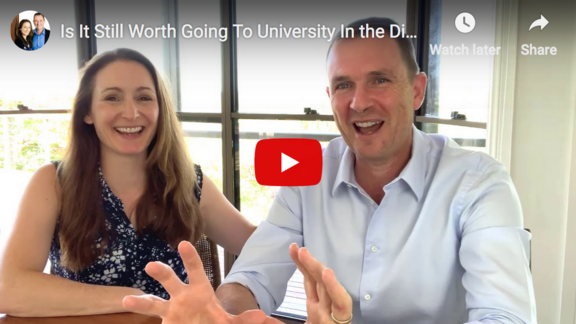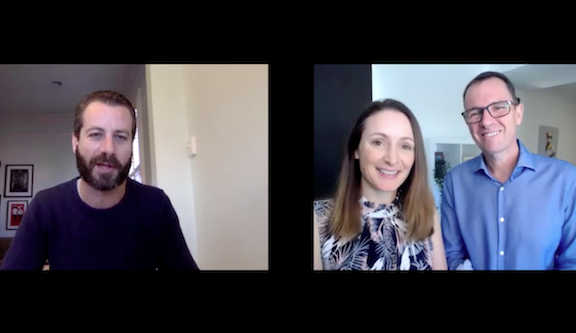It’s been a pretty controversial topic lately. Should we still be encouraging our kids to go to university? Or should we as adults even be looking to go to university, or any other form of higher qualifications?
Matt and I recently spoke to some experts in America around the changes to corporate training. There are some new and exciting ways to help us keep up-to-date with qualifications in our industry that are actually relevant to today’s digital space.
Matt: G’day, it’s Matt and Liz Raad here and today at our kitchen table, we’re just talking about our kids’ education. Which is really interesting because-
Liz: Well, what Matt said to me, “Should our kids be doing a degree?” And that started a bit of a conversation.
Matt: It was really interesting because-
Liz: [Laughs] Because we did (go to University) and got degrees. Really useful ones.
Is a Degree Still Worth Having?
Matt: We did zoology. That was useful. So, very relevant topic but we know a lot of you have kids and you’re thinking, “Oh, do we send them off to go to University?” And what also prompted this-
Liz: Also for us too, do we go back to University? Do a Masters degree?
Matt: Well, what prompted this for us-
Liz: Not me. I am never studying at University ever again.
Matt: [Laughs] I know.
Liz: I should never say that.
Matt: Formal education … Anyway, we won’t go there, what my real opinion is of formal education in this day and age. But I will share it via the talk that Liz gave when she recently spoke at Pause Fest Digital Conference and through this we got to meet Scott Kirkpatrick – the president of a big American education company called General Assembly.
The kind of training and qualifications big corporates now want…
Scott Kirkpatrick gave a really interesting talk about what’s happening with formal education over there in America. And his company General Assembly basically provides trained people in IT and the digital space for big corporates in America. So, he’s at the forefront of who’s hiring, and the big hiring companies out there and what he was saying is, “Look, the world’s changed. Formal education no longer can keep up with it.”
Liz: So, that’s the biggest complaint that’s coming out of big corporate America and I’m sure it’s happening here in Australia as well. We know it happens in digital marketing. Companies cannot get people who have relevant, up to date qualifications; because they come out of University with degrees that were created five years ago, or 10 years ago sometimes!
Matt: And it’s not keeping up. Especially in our field, digital marketing, right?
Liz: [Laughs] What, zoology?
The problem with formal digital marketing degrees…
Matt: [Laughs] No, not zoology … Our field now. Graduates coming out of digital marketing degrees or training and they can’t even build a website. They don’t even know what SEO is, they don’t know how it works. That’s ridiculous. That is so backward, it’s just not funny.
Liz: Don’t get Matt started on that.
Should Working Adults Do A University Degree?
Matt: I won’t get started on that. But the President of General Assembly was saying the same thing and what he suggested, what’s working better now (and he also had another practical viewpoint, which you might want to consider here), is that in America, a big genuine concern is around a coming recession. So, these students are signing up – and a lot of them are working adults doing further education. So, his company is like ours (eBusiness Institute). They train a lot of adults. They see a lot of adults re-training, working hard at night to do a four-year degree part time for an MBA that’s not even going to be relevant or exist anymore!
Liz: Somewhere between 20 and 100 thousand dollars.
Matt: Yes and the problem is, if they lose their job, there goes four years’ worth of training for them. They might be halfway through their degree. So, there’s that valid practical side as well.
The Incredible Value Of “Micro-Credentials”!
So, what’s working well and working with these big corporates is, what Scott Kirkpatrick (COO General Assembly) calls micro-credentials, and I think that’s a fascinating term. One that I would love to use a lot more of. I think it’s spot on: “Micro-Credentials”.
And what he’s talking about is people lowering their risk by doing little micro-credential type courses that are highly practical and they are moving with the times and if they become obsolete, so what? Because it’s just a little micro-credential. You simply update and do another one.
And so, people are doing these small training courses, very similar to what we offer here at the eBusiness Institute. (There’s a bit of a plug for some of our courses!) You can do them in any field but, in particular the digital space, because that’s where the action is, that’s where a lot of the money is.
Best training courses if you are looking for a highly paid job or contract work…
If you want a highly paid job, even within your existing organization, just doing a little bit of micro-training in some digital aspect, like maybe do some social media type training or do some email type training, learn how to use CRM or specific … They do a lot of coding. Now, coding, you can pretty much write your own wage…
Liz: Yeah, I’m going to get into an argument about coding.
Matt: But you can pretty much write your own wage on coding.
Liz: I still don’t think kids should learn to code. [Click here to hear Matt and Liz Raad debate whether kids should learn to code]
Matt: [laughs] – But let’s stay on topic.
Liz: We’ll stay on topic.
Matt: These micro-credential courses, though, you can do right now. There’s lots of courses out there that are highly practical, that will give you really good training for the future. They’re not high risk.
Future proofing your job security through smart further education course choices…
Liz: Yes. So, focus on those small training courses that you can do to step yourself forward or to make your job more secure. So, maybe talk to your employer about the sort of things that they want to see you head towards. Maybe their future direction. Have a look at the direction of the company and where they’re moving, and what sort of jobs are going to come up.
“Keep an eye on the jobs that are coming up in your industry and start doing small micro-credentials (small flexible training courses) along those lines.” – Liz Raad
Now, of course, we’re biased. We think some digital micro-credentials really help in virtually any industry in any job. Understanding how the web works, how you market, how you get a message out online is a really, really valuable skill. Because one day, if you do decide to throw the job and get in and be an entrepreneur and start your own business or buy a business, then being able to market (especially online) is going to be the number one skill, I think, that gets you success.
Matt: Absolutely.
Liz: Definitely worth thinking about.
Matt: So, little bit controversial but it is kind of amusing.
Is it worth going to University anymore?…
Liz: Do our kids go to university? I think they will go just to have some fun.
Matt: And when you think about how our lives are ruled now by digital disruption and it’s funny, even in education, education is the ultimate … well, they’ve been disrupted, okay? By micro-credentials. So, seriously consider whether or not you invest all that money into a four or five year degree and have a look around at what other smaller, more relevant and up-to-date training courses are available.
Liz: Worth considering. Or comment below, tell us, are you going to go to University? Are you going to send your kids to University? I’d be fascinated to know.




